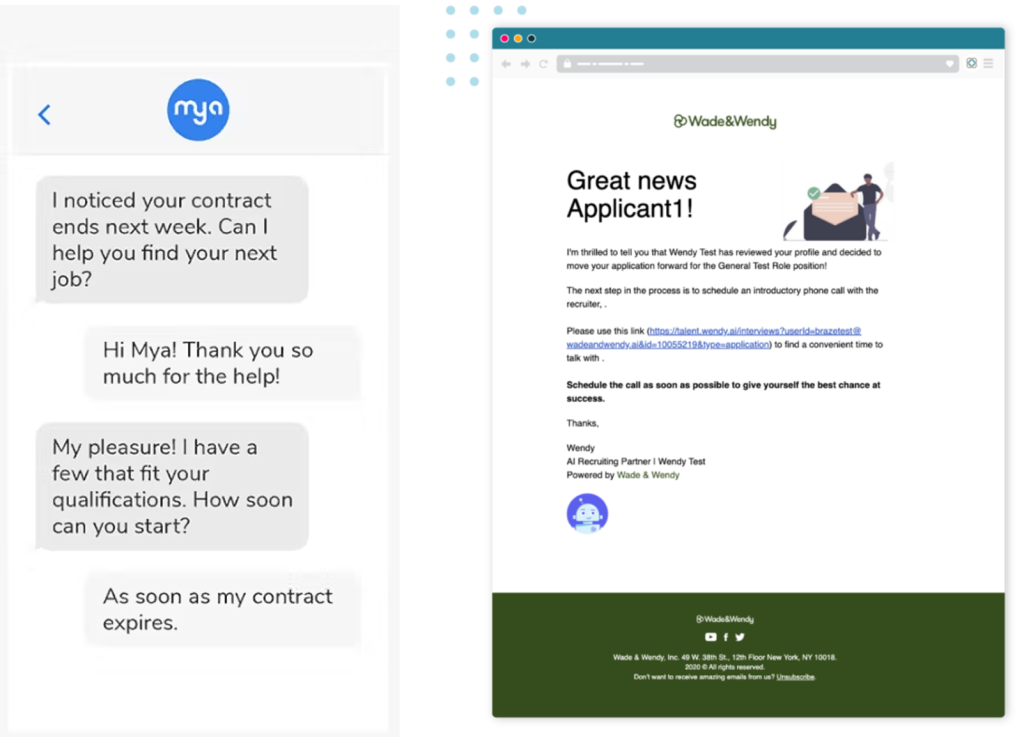Artificial intelligence in recruiting: benefit or… hype?
Today, artificial intelligence (AI) is already solving problems related to face recognition, X-ray analysis, fake detection and even creating a model of an ideal client. It is predicted to succeed in many areas, including recruiting. There is even an opinion that AI will replace 16% of recruiters in the coming years. But is it so easy? Let’s try to figure out whether this trend has more benefits or hype.
Thus, Marketsandmarkets in its research says that the AI software market will approach $126 billion within 2 years. It is about the use of AI elements in telecommunications, cars, finance, educational projects, e-commerce, etc.
Recruiting also has its own examples. This is Mya Systems chatbot, which is based on conversational AI and simplifies hiring in recruitment agencies. Another one – Wade & Wendy – demonstrates success in conversational recruiting scripts that are created individually for the customer company.
HireBot is also gaining momentum, promising to automate the search, selection and communication with applicants as much as possible thanks to AI. At the same time, it is widely believed that in 5-6 years, companies will cut about 16% of recruiters due to AI.

However, the founder of CleverStaff Volodymyr Barkhat suggests not to worry about this prematurely. After all, it is in recruiting where AI remains questionable.
AІ in recruiting is more complicated than “find by photo”
The fact is that machine learning – as one of the methods of AI implementation – effectively solves tasks that aim to find the right option among a number of probable ones. This includes “reading” a person’s age based on a photo or determining the brand/model/year of production of a car.
If you ask a person to do it, he/she will use his/her memory, which contains a set of car brands and their appearance. AI neural network can also have a database of examples and “teach” algorithms to find the right option.
At the same time, when AI is tasked with finding people for a particular vacancy based on resumes, relying only on keywords, this is not a correct task for it. Because a recruiter or HR analyzes not only resumes. In his area of responsibility there is also communication with applicants by phone, and constant correspondence, and interviews, including video, etc.
James Michin, a consultant at Pearn Kandola recruitment agency (Great Britain), shares the same opinion. He is convinced that AI systems still need to be improved. “At the interview, it is important not only to evaluate what and how the candidate is saying, but also to feel the semantics and see the context. In these conditions, AI can make a mistake, and the recruiter will intuitively perceive the essence”.
Sandra Wachter from Oxford University, believes that the “machine” is always looking for patterns and similarities among the data sets. “Meanwhile, when the program’s algorithms are not perfect, some candidates may be left out – women or people who are not white,” the scientist emphasizes. It turns out that such an AI decision is unethical, because it is colored by prejudice. Due to these shortcomings, Amazon suspended one of its recruiting programs a few years ago, which discriminated against female candidates in this way.
The first obstacle is the inability to digitize everything
Let’s think further. A recruiter or HR accumulates and analyzes a lot of data about candidates in person. Not all this information gets into the system for recruiting. Information about temperament, soft skills, emotional impression from the interview, etc. is not digitized. And, in fact, the final choice is based to some extent on intuition, a sense of prospects and reliability of the future employee. Currently, it is unrealistic to digitize all this, and as a result, it is impossible to formulate a relevant task for AI. “Those who, based on a resume and a few comments, set a task for AI to find the right specialist, mislead both themselves and their clients,” Volodymyr Barkhat comments.

Volodymyr Barkhat, the founder of CleverStaff
“Some developers take advantage of the hype that AI creates around it and use it for tasks that it cannot do. Or… they simply inform users and investors about the presence of AI – because its algorithms are very difficult to verify”
“At the same time, we are able to predict in which task AI can demonstrate efficiency. To do this, we need to analyze whether we are able to transfer to AI the same amount of information with which a person solves the same task. If we know the possible results in advance, then the task for AI to choose the right option from many is correct”.
AI in Pymetrics
Pymetrics has developed a whole package of psychological tests for candidates, which are able to analyze about 90 different indicators. Answers to the questions of these tests allow a thorough analysis of the personality – from tolerance to the ability to respond quickly to challenges
The developers claim that their system guarantees a fair assessment because all algorithms have been thoroughly tested for several years and exclude subjectivity and even hints of discrimination.
Pymetrics even has demonstrated what their testing algorithms are based on in order to avoid possible accusations of bias in assessments related to previous successful hiring. And even if the test is successful, the candidate is still interviewed.
Pymetrics tests have been used by McDonalds, Tesla, Unilever and other giants for some time now.
AI in HireVue
This program writes on video the answers of candidates to the recruiter’s questions, and then its algorithms study the information received by many indicators. For example, the system analyzes how many times the respondent said “I” while answering questions about teamwork.
HireVue “decomposes” more than a million elements of information about the applicant, which comes minute by minute. In this way, recruiters can understand the degree of sincerity, honesty, confidence in their abilities and many other useful data. Then there are 2 ways – either to refuse or to invite a person for an individual interview. But with all the objectivity of HireVue, only 20% of candidates are hired after analyzing the video with the help of AI, 80% still have an additional interview with a recruiter.
AI in HireVue also has well-known supporters, for example, the Hilton International network: they report an increase in hiring efficiency by as much as 16%.
Can AI qualitatively replace a recruiter?
Selection rather than search
Modern recruiting software analyzes candidates’ resumes based on keywords. They also help to make a more accurate selection. Therefore, their functionality has more impact on the selection process rather than the search; and only when it comes to line staff or positions where certain competencies are clearly identified.
In the case of top management, the employer will not be able to do without the help of a recruiter. Because it is possible that AI will simply filter the resume, which will not tell everything about the experience and other key facts. This also applies to unique specialists or passive candidates. In these situations, you cannot do anything without a recruiter.
Risk of subjective assessment
When selecting a specialist, the recruiter analyzes the capabilities and characteristics of the employer and compares the hard and soft skills of the applicant with them. When there are more matches than minuses, the process moves forward.
It is even more difficult with the business owner. After all, when meeting a candidate, he wants to feel the “chemistry”, similarity of thinking, comfort in communication, etc. These moments cannot be “calculated” by AI. A recruiter will be able to.
AI loses to intuition
The recruiter evaluates the applicant not only by hard skills, but also closely observes his emotional intelligence, behavior, body language, etc. The combination of these elements creates a certain personality model that either fits the vacancy or not, or not at all. Only an individual interview provides deeper information about professional and personal abilities. By the way, it is the interview that can change the impression of the candidate, which is formed when reading the resume.
What is the result?
So, despite the “trendiness” of AI, so far it cannot fully replace a recruiter. Personalized analysis and evaluation of a candidate cannot be fully automated based on the same algorithms.
The AI mechanism will not soon acquire all the functionality of a recruiter because the extremely large amount of information cannot be digitized and is processed intuitively. This means that it makes it impossible to form a correct task for AI.
Therefore, we can assume that future innovations in recruiting will be felt not so much due to AI as to big data algorithms.
Today, the psychological and communicative component of a recruiter’s work cannot be fully replaced by programs. But you can use automated systems that remove routine, increase the professional level and productivity of a recruiter, improve mood and change attitude to work in general.
Information for those who are already worried that AI will send classic recruiting “to the archive”: it is predicted that new professions will appear in the future. For example, HR algorithms auditor, chatbot trainer, HR database detective, AI interaction manager, etc.
Well, let’s wait ☺